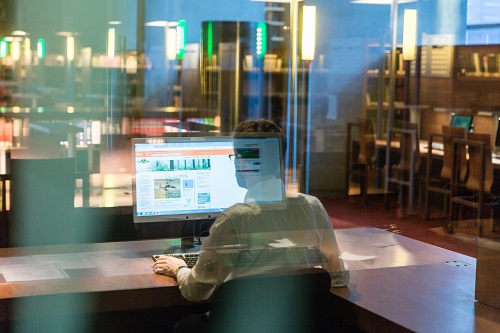Consult “Archives de l'internet”
Is the page you want to consult no longer on the live web? Would you like to know what the website of the Louvre, the Élysée Palace or the French Human Rights League (LDH) looked like ten years ago? Would you like to find a history blog that has now disappeared?
As part of its legal deposit activities, the BnF regularly collects thousands of web pages in order to build up a memory of our times and of the essential medium that the Web has become. Its collection of archived sites, which is one of the oldest and richest in the world, is open to anyone wishing to carry out academic, professional or personal research.
Accessing the web archives
The web archives can be consulted:
-
In the Research Rooms of the various BnF sites, by holders of a research pass. The web archives can be consulted there either on computer workstations with free access and no need to book, from the document portal, or via your personal computer by downloading the AVEC application.
-
In printer legal deposit libraries in the French regions offering access to web archives. Terms and conditions of consultation are available from the establishments concerned.
In accordance with intellectual property law, the collections are not accessible online.
Access Applications and tools
The “Archives de l’internet” application : go back in time
The web legal deposit collections can be consulted via the “Archives de l’internet” application, which lets you view the content collected in a browser, in a browsing context similar to the one that existed at the time of collection, and browse the Web of the past as well as the live internet, by clicking from link to link, using a URL search.
The “Archives de l’internet” application works in the same way as Internet Archive’s Wayback Machine. The collections accessible via the two tools are complementary. Since the early 2000s, French web content has been better covered in the BnF’s collections than in Internet Archive’s collections, as the French Web is collected in greater depth by the BnF’s bots as part of its legal deposit activity.
Search medthods and entry points
Several search methods are available:
- Keyword searches within the content of archived pages are available for the following collections: News, Covid-19, 2015 attacks, French web incunabula, Elections (2002-2010), and a collection of literary websites gathered during the LifraNum project.
- Searching by URL is available for all web archive collections, via the “Archives de l’internet” application. Apart from the collections mentioned above, you need to know the exact URL of a site in order to consult it. To find URLs, there are several tricks or search methods available to you: search for URLs on the live web using a search engine, e.g. Google; the datasets available on the API et Jeux de données and data.gouv.fr websites list the starting URLs of focused crawls in tabulated format, and allow you to search by theme, keyword or character string.
- “Guided tours” allow you to explore themes through a selection of websites.
- Tools for enriched exploration and assistance with text and data mining are also available in the BnF DataLab, depending on your research projects.
A wide range of services are available to help you use the web archives, including training courses, workshops, ad-hoc help with documentary research and support for research projects.
Re-using archived contents
The short quote exception allows you to quote and reproduce extracts of text contained in archived pages. The re-use and reproduction of archived web content in a publication or for commercial use requires the prior authorisation of the rights holders.
The permalink (e.g. http://archivesinternet.bnf.fr/20200310105902/http://www.bnf.fr/fr) shown in the orange banner of the web archives will allow you to refer in your publication to the precise capture of a web page collected at a given moment.
A service for extracting websites from web archives is offered by the BnF’s Image and Digital Services Department. A reproduction authorisation form, to be signed by the owners of copyright on the site, is available.



